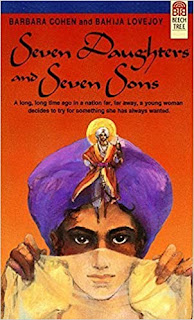In this case, although the classic trope of jealous sisters starts the tale, the treasure motifs end it. Wiggin and Smith were wise, in my mind, to focus on the quest part of the tale.
The notable part of the quest is that the sister of the two princes--all three stolen from their imperial parents at birth--is the ultimate heroine. As others have pointed out before me, many fairy tales focus on the female protagonist. How many Disney princesses graced the screen before Aladdin came along?
Lots.
The impressive aspect of the above tale is that the princess is not commended merely for her sweetness and patience, etc. etc.--which type of praise pales after awhile. The quest begins with her ambition to own the aforementioned treasures and ends with her clever handling of the quest's tasks. Her education and skills are emphasized. She is not thrown into a quest during which she collects abilities (a good plot, by itself). She applies previously acquired traits and abilities to the quest.Her heirs are myriad, including Avaris from The Horse and His Boy. She bursts onto the scene with a full personality of toughness and cleverness and honor. In the hands of a master storyteller, and with a longer plot, Avaris does learn and grow. She remains a powerhouse character, somewhat unusual even today.
Another clever, if someone more reticent, heroine appears in one of my father's favorite books, Seven Daughters and Seven Sons by Barbara Cohen and Bahija Lovejoy. The book is a splendid retelling of a classic Arabian tale. Interestingly enough, the heroine copes with the imposition of the hijab:Once women had been musicians, scholars, warriors, poets, and merchants. But the descendants of the caliphs, who'd founded Baghdad forgot their desert heritage. Addicted to nothing but luxury, they'd permitted actual power to fall into the hands of Persian conquerors, who brought with them their own customs, including the hajib, the veil for women. It was their way of distinguishing free women from concubines. Turks had followed Persians but the veil remained. In the end, of course, all women wore it, and none of them were free.
It is an amazing passage in a YA book and reminds readers (1) history does not work on a trajectory--but rather, moves forward and back; (2) strong women exist in all cultures.
Yasmin Mohammad and Ayaan Hirsi Ali would concur.




No comments:
Post a Comment